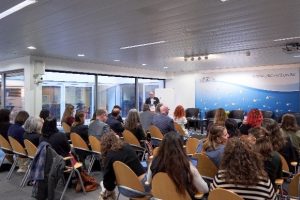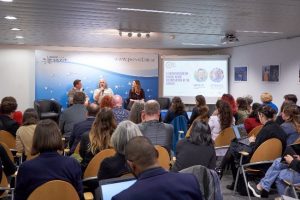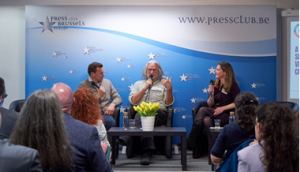
In Conversation With Bart Claes, Director, Victim Support Flanders & Brussels (CAW) & Professor Restorative Justice, Avans University of Applied Sciences and Staf Van Pelt (Ex-victim of Church Sexual Abuse)
This article in the “In Conversation With” series captures a conversation that took place during the Symposium: “Leave No Victim Behind: Victims’ Rights and the Sustainable Development Goals.” Organised by Victim Support Europe on 22 February 2024, this event commemorated the European Day for Victims of Crime and was dedicated to advocating for progress and legal improvements in comprehensive support for all victims, regardless of the crime or the victim.

Figure 1. Levent Altan delivers his opening speech at 2024 Symposium.
The 2024 Symposium aimed to underscore the intrinsic connection between victims’ rights and the achievement of Sustainable Development Goals (SDGs). By fostering stakeholder dialogue, the event sought to address identifiable gaps and challenges within victim support while highlighting the importance of an inclusive approach to sustainable development.
Through victims’ testimonies and experts’ insights, light was shed on the enduring impact of sexual abuse victimisation within the church and underscores the critical need for comprehensive victim support mechanisms. This transcript captures the voices of Bart Claes, Director of CAW, and Staf Van Pelt, an ex-victim of sexual abuse within the church (we stick to the wording Staf prefers to use), as they delve into the complexities of victimisation, the challenges of speaking out, and the path towards healing and empowerment.
Bart: Staf, thank you very much for the opportunity to talk with you. After listening to the various speakers just now, it appears that victimisation, or the experience of victimisation, is often associated with events taking place now, today, here in time, or that it is associated with online crime, theft, or violence between partners. However, your experience of victimisation, which took place many years ago, is entirely different: can I ask you to take us back to your childhood?
Staf: Okay, so this is what happened to me. Firstly, my father passed away when I was 10 years old. I then needed additional academic support, so a local priest began tutoring me at home. Over a four year period – between 1966 and 1970, or thereabouts – he sexually abused me.
Bart: When you say that you became a victim of sexual abuse, does that include all forms of sexual abuse?
Staf: Yes, the abuse started very gradually, I was drawn into it. My lack of power was important, at a certain point I felt that “something is not right, I’m being lured into a trap”, but I couldn’t prevent it.
Bart: And when you feel powerless as a child, you can feel that somehow certain things are wrong, or inappropriate. Did you ever feel that you had the option to reach out to someone else, to talk about what was going on?
Staf: That was actually very difficult, my mother was not coping well after my father’s death and I didn’t want to burden her with what had happened to me. So, I never actually spoke about what was going on, I kept it to myself for decades.
Bart: In preparation for today’s conversation, you mentioned several times the difficulty of verbally communicating what had happened during your childhood. And that not having words to express yourself has made it difficult to engage in conversations about your experience.

Figure 2. Staf Van Pelt and Bart Claes in conversation.
Staf: Yes, I found that incredibly difficult, because the experience is so incredibly confusing. As I said later when I was in therapy, I could not find the words to explain what was happening. At a certain point during the sexual abuse I felt detached from my body, I disassociated; I actually didn’t know what was happening and lost contact with my feelings. I couldn’t express how I felt at all, it was as if my feelings no longer belonged to me.
Bart: So, I hear you saying that you were confused and that being confused made it very difficult to express your feelings, your thoughts, or to ask for help. It seems as if you adopted a survival mechanism to protect yourself and to distance yourself from what was physically happening to you, is that correct?
Staf: Yes, on the one hand, it was self-protection, but it was also a sort of powerlessness. I missed the ability to feel: when I saw my friends being able to feel, I noticed that I couldn’t feel. The longer time passed, the more I found myself in a situation where I felt or recognized something was wrong with me. But I didn’t know what it was, I couldn’t understand it.
Bart: If we move forward, we come to your adolescence. Many people also associate adolescence with emerging sexuality, entering relationships, experiencing love, perhaps finding a partner. Did your experience between the ages of 10 and 14 have an impact on your adolescence and adulthood?
Staf: Hmm, I recognized that something was wrong with me but not what it was; so, as a teenager I became quite violent, I committed some vandalism, broke into houses, and so on. This was my way of releasing my stress and being able to ‘stand in my world’.
Bart: So, the suffering you were dealing with, that stress, manifested itself in negative behaviour, in anti-social behaviours towards others.
Staf: Yes, completely; and I was also bullying others. I felt that I could somehow get rid of my hurt by hurting others, by letting my aggression out instead of talking about my deep-rooted emotional pain that I couldn’t access.
Bart: Your behaviour gives us a very different picture of victimhood and the experience of victimhood. People think they understand what being a victim means; however, you’re telling us that your feelings were expressed by behaviours that many people don’t associate with feelings of victimhood.
Staf: Yes, that’s correct. When I got married and had children, I noticed that at a certain point I had the urge to abuse my own children. I told myself, “No, you’re not going to do that! You’re going into therapy to find out what’s wrong. Don’t repeat what you’ve experienced yourself.”
Bart: I think many people here will want to find out when you first started to speak about the abuse you experienced between the ages of 10 and 14.
Staf: I went into therapy when my children were one or two years old, I was 27 at the time.
Bart: If you look back now at that period between 14 and 27, which parts of your life did that experience of victimisation most impact?
Staf: The biggest impact has been with handling conflict with authority figures. I’ve always had arguments with my bosses, which meant that I frequently got fired and I’ve had a lot of difficult work experiences. I couldn’t form a continuous career path: I stumbled from one job to another, often working well below my ability, just taking on jobs to survive.
On the other hand, I also have problems with intimacy. When my wife used to touch me, I would be startled and withdraw. She didn’t feel seen as a woman, that also made her a victim of the situation and ultimately led to us divorcing.
Bart: If you look back on your past with today’s perspective, where the zeitgeist is different and more opportunities exist for school-age victims to receive support and to discuss their situation, what would have empowered you as a 10-year-old child to speak, to express yourself, or to ask for help? To prevent internalising your feelings until you were 27?
Staf: I think it’s very important to be able to speak about what’s happened as soon as possible. The longer you remain silent, the more you cultivate that fear within yourself and the greater it becomes. But it’s also important to find the right channels. To know that there are people who can understand and support children; who can share your burden, who show you warmth, who hug you, who ensure that that you feel safe, that ‘here I am not being abused, so here I can speak freely and show my sadness and feelings.’
Bart: Imagine you could offer advice to victim support professionals, what advice would you give them to reach out effectively, warmly and safely, to children who have experienced the same abuse as you have?
Staf: I would suggest that they sit next to the victim rather than opposite them. Sit next to them so that you become an ally, someone who – so to speak – can protect them, with who you can move forward together and feel supported by. The experience of abuse is primarily a feeling of abandonment that you can’t carry alone; you need others to help you process the experience.
Bart: While I hear you advising a victim support professional to sit beside the victim, to – as it were – put themselves in the child’s place, do you feel that there was no one there for you and that this is what prevented you from speaking?

Figure 3. Staf Van Pelt and Bart Claes in conversation.
Staf: Yes, because we all need warmth, close and physical contact. We need more than words, we need touch, attachment, hugs; to be able to relax, access your emotions and shake off your sadness, your feelings of helplessness, your fear and your pain. It’s also important that people can deal with their bodies and the effects of physical contact.
Bart: I have two more short questions for you relating to our preparation session. Firstly, when you described yourself, you said you saw yourself as someone with an experience of victimhood rather than seeing yourself as a victim; can you tell us why that distinction is important to you?
Staf: I no longer see myself as a victim, I see myself as an ex-victim but I don’t see myself as a survivor. Why? Because I would regret that my life were to be determined by an event – committed by a priest who was himself lost – that happened almost 60 years ago. I think it’s important to learn from my experiences, to find strength to interact differently – more sensitively and compassionately – with my environment. Life has taught me to be aware of abuse and of people who offer false promises to achieve their ends.
I think it’s important that I can provide guidance to people who have not only been victims of sexual abuse but also to those who are perpetrators of such acts.
Bart: That was going to be my last question for you. With victimhood also comes perpetration, that is the act of being an offender. Today, we’re here with representatives from many organisations, experts and professionals who work with victims and are involved in victimhood; however, the line between victimhood and perpetration is sometimes very thin. How do you deal with perpetrators of sexual abuse?
Staf: Actually, perpetration and victimhood are two wings of the same butterfly, two sides of the same coin. When you talk in depth with perpetrators, you often encounter stories of victimhood; the reality is that about one-third of victims will become a perpetrator. Victimhood and perpetration are strongly related so your emotional phantoms must be given light. Once a conversation has been started and a perpetrator has begun to understand the root cause of their own pain, then any motivation to repeat the behaviours they experienced will disappear.
Bart: I want to thank you very much for this conversation. Do you have a final message you would like to convey? Have you said everything you would like to say?
Staf: Of course, I could speak a lot more on this topic, but time is limited. I think it’s very important that – no matter what you do: whether you’re a support worker, a colleague at work, you name it – you ask yourself what actions you might be guilty of; furthermore, you should examine yourself for any experiences of victimhood. Use introspection to identify what’s happening inside of me; from such introspection you can actually work better with your client.

